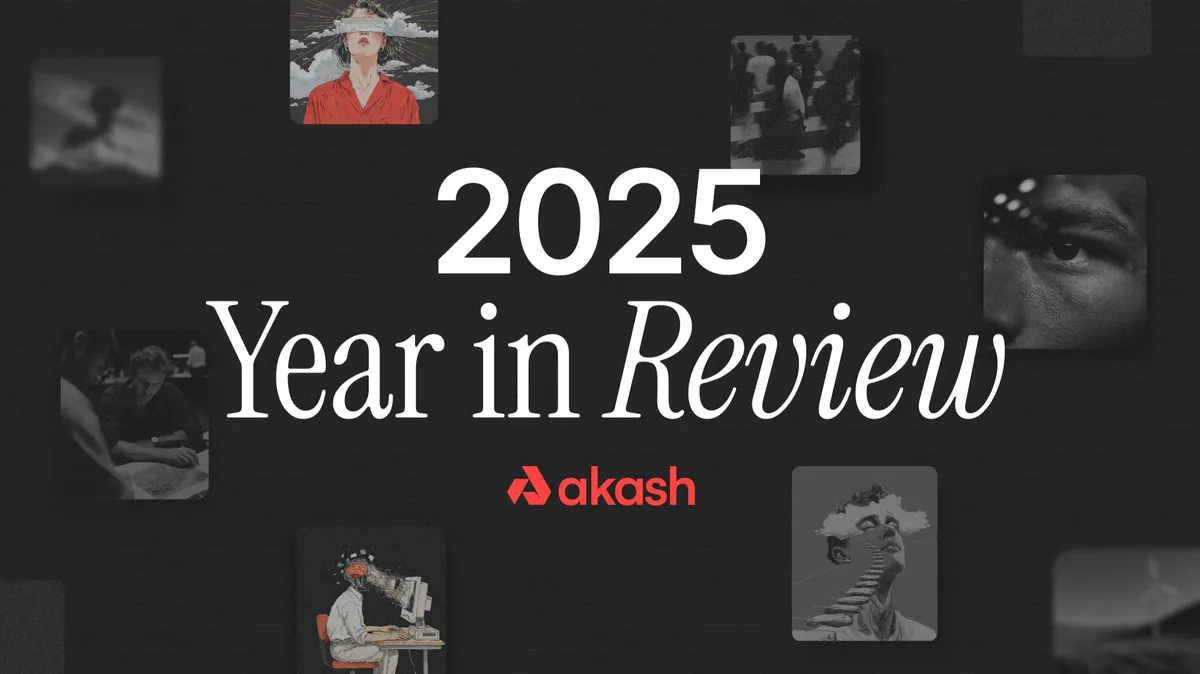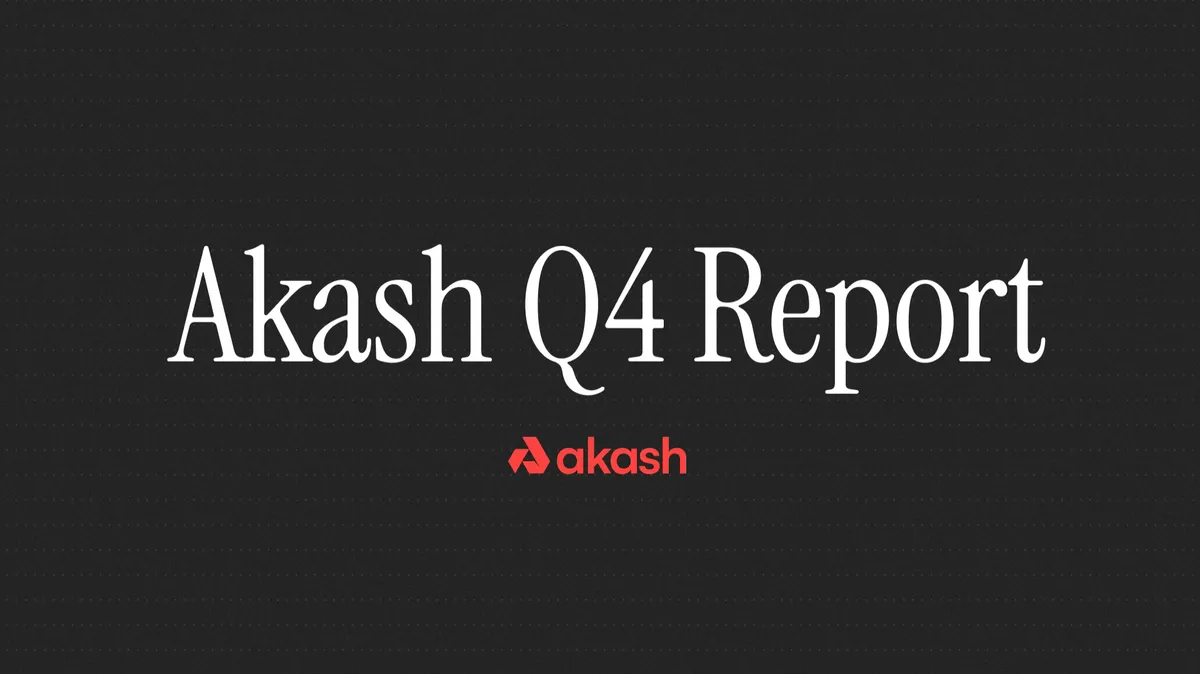
Akash Weekly with Greg Osuri is our weekly community call hosted on Twitter Spaces. Each week, we cover the latest news and updates from Akash Network with our CEO, Greg Osuri.
Follow Akash Network (@akashnet_) on Twitter to get notifications for all future Akash Weekly events. We’re live every Wednesday at 8 AM PT. Tune in next week for the latest from Akash and conversations with special guests!
Sign up for our newsletter to stay up to date with everything Akash Network.
On this Akash Weekly:
- Greg Osuri, CEO & Co-Founder of Overclock Labs (creator of Akash Network) @gregosuri
- Andrew Mello, Head of Mining at Overclock Labs
- Jonmichael Hands, VP of Storage at Chia Network
- Joao Luna, Akash Insider & Creator of Akash’s Terraform Integration
Our topics this week:
- An overview of the Akash Ecosystem
- Chia launches Bladebit Disk Beta
- Joao Luna walks us through Akash’s Terraform integration
Greg Osuri’s Akash Ecosystem Updates
One of the greatest strengths of Akash Network is the ecosystem of developers working to build tools that bring value to everyone on the network.
Cloudmos (formerly Akashlytics)
Cloudmos is the defacto deployment tool on Akash Network, which is a testament to the product’s ease of use and intuitiveness for both new and experienced users. Cloudmos is also releasing an explorer for Akash Network, along with a price comparison tool.
Praetor
Praetor is building an intuitive solution for providers on Akash Network, which will enable Akash providers to rapidly get up and running on the network. Praetor is now called Akash provider console
Spheron
Spheron is also building a tool to make deploying on Akash easy and intuitive. They also will offer multi-coin settlements.
Cosmos Directory
Cosmos Directory has also joined Akash. They offer a highly curated list of RPC servers for any of the Cosmos SDK chains and are fulfilling a real need for a project directory in the web3 space.
Dimokus (@dimokus_vrn) is running a VPN server on Akash for $0.18 per month.
This highlights the low-cost and flexibility of deploying on Akash Network, and begs the question: What other deployments are possible?

Chia Launches Bladebit Disk Beta
Chia, a decentralized blockchain based on a consensus mechanism called Proof of Space and Time, launched its beta of Bladebit Disk—which gives users even more flexibility when creating Chia plots.
Plotting on Chia is a one-time process that requires significant computational resources to complete. Once the plot is created, it can be transferred to storage and farmed for five to seven years.
In initial testing, Andrew Mello (Head of Mining at Overlock Labs) discovered that Bladebit Disk scales exceptionally well on virtualized Kubernetes environments on Akash Network.
Bladebit Disk on Akash Network
Within eight hours of the beta launch, Bladebit Disk was available for the entire network via Cloudmos (formerly Akashlytics). This showcases the exceptional flexibility of Akash and the speed that new deployments can be made available to everyone on the network. In addition, Bladebit Disk is a very profitable workload for providers. It will generate \(200-350 per month, per workload, at\)0.15/plot cost on modern hardware (defined as CPUs, memory, and hard drives produced within the past three years).
Any providers that want to upgrade to support this workload should feel free to reach out to us if they have questions.
Run Bladebit Disk Now on Akash Network
The fastest (and only) way to run Bladebit Disk right now is to deploy on Akash Network.
First, launch Cloudmos (formerly Akashlytics) > Templates > Mining > Bladebit Disk.
Joao Luna on Akash’s Terraform Integration
Luna was inspired to integrate Akash with Terraform to make managing multiple workloads from both Akash and web2 providers easier. Given Terraform’s status in the legacy cloud market, this integration will make it much easier for developers to begin to move workloads onto Akash Network—while still managing everything from the same Terraform environment they are already running.
Luna mentions that Akash’s Terraform integration works best for:
- Developers
- Operations Teams
Anyone that has any feature requests or suggestions should feel free to head over to Joao Luna’s GitHub, as his Terraform integration is open source.
Q&A
Q: What problem does Akash Network solve?
Akash Network is the first viable open cloud. The mission of the network is to decentralize the market for cloud compute. This will balance the market power of large cloud providers, as the market is currently controlled by an oligopoly of only three major providers.
There is also a widespread underutilization problem with cloud providers. Offering unused compute capacity on Akash helps providers maximize profitability for their resources.
Q: What is Akash’s plan to onboard more people into the decentralized cloud?
The first step is improving the product so that it’s easier for more people to use. Second, we will work with protocol clients to improve retention.
We will work to maximize market penetration within the Cosmos ecosystem (which includes RPC servers, node providers, and websites, among others). This initiative is going well.
Next, we will move outward to the broader web3 community. We just beginning this work, and are already seeing traction.
Beyond that, we will move into the high-performance computing market.
Our goal for each of these phases is to offer a value proposition that cannot be found elsewhere. We aspire to offer a product that isn’t offered anywhere else in Web2 or Web3.
Q: When will Akash be able to offer managed services?
Managed services are something we would like to offer down the road, but for the immediate future, we are going to prioritize retention and our current roadmap.
Q: I know a few cloud service providers who would be interested in using Akash. Who should I have them connect with?
We would be happy to connect! Please reach out to Boz Menzalji, COO of Overclock Labs, or Greg Osuri, CEO of Overclock Labs.


